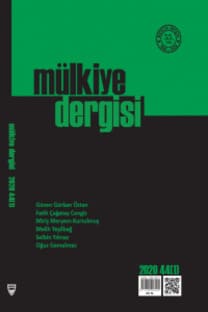Türkiye'de eğitim ve sınıf üzerine gözlemle
Observations on education and class in Turkey
___
- Althusser, Louis (1991). İdeoloji ve Devletin İdeolojik Aygıtları, çev. M. Özışık ve Yusuf Alp, İstanbul: İletişim Yayınları.
- Bahçe, Serdal ve Ahmet Haşim Köse (2010). "Krizin Teğet Geçtiği Ülkeden Krize Bakış: Teorinin Naifliği Gerçekliğin Kabalığı", Praksis, S. 22, s. 9-40.
- Bahçe, Serdal ve Ahmet Haşim Köse (2011). "Fiyatı Toplumsal Olarak Yorumlamak: Kapitalizmden Sınıf ve Enflasyon Manzaraları", Nihat Falay, Ahmet Haşim Köse ve Abuzer Pınar (der.). Kriz ve Maliye Düşüncesinde Değişim: İzzettin Önder'e Armağan, SAV [Sosyal Araştırmalar Vakfı] Yayınları, İstanbul.
- Bahçe, Serdal, Faik Yücel Günaydın ve Ahmet Haşim Köse (2011). " Türkiye'de Toplumsal Sınıf Haritaları: Sınıf Oluşumları ve Sınıf Hareketliliği Üzerine Karşılaştırmalı Bir Çalışma", Serdar Şahinkaya ve İlter Ertuğrul (der.). Bilsay Kuruç'a Armağan, Mülkiyeliler Birliği Yayınları No. 2011/1, Ankara.
- Bernal, Jose Luis (2005). "Parental Choice, Social Class and Merket Forces", Journal of Education Policy, C. 20, S. 6, s. 779-792.
- Becker, Gary S. (1962). "Investment in Human Capital: A Theoretical Analysis", Journal of Political Economy, C. 70, S. 5, s. 9-49.
- Becker, Gary S. (1964). "Human Capital: A Theoretical and Empirical Analysis with Special Reference to Education", New York: NBER.
- Bourdieu, Pierre ve Jean Claude Passeron (1977). Reproduction in Education Society and Culture, Beverly Hills: Calif. Sage.
- Bowles, Samuel ve Herbert Gintis (1975). "The Problem with Human Capital Theory: A Marxian Critique", The American Economic Review, C. 65, S. 2, Papers and Proceedings of the Eighty-seventh Annual Meeting of the American Economic Association, s. 74-82.
- Ercan, Fuat (1998) Eğitim ve Kapitalizm: Neo-Liberal Eğitim Ekonomisinin Eleştirisi, İstanbul: ÖES Yayınları.
- Georgiadis, Nikos M. (2007). "Educational Reforms in Greece (1959 - 1997) and Human Capital Theory", Journal for Critical Education Policy Srudies, C. 5, S. 2.
- Hansen, Marianne Nordli (2001). "Education and Economic Rewards: variation by Social Class and Income Measures", European Sociological Review, C. 17, S. 3, s. 209-231.
- Köse, Ahmet Haşim ve S. Bahçe (2009a) "Yoksulluk" Yazının Yoksulluğu: Toplumsal Sınıflarla Düşünmek", Praksis, S. 19, s. 385-419.
- Köse, Ahmet Haşim ve Serdal Bahçe (2009b). "'Hayırsever' Devletin Yükselişi: AKP Yönetiminde Gelir Dağılımı ve Yoksulluk", AKP Kitabı der. İ. Uzgel ve B. Duru, Ankara, Phoenix Yayınevi, s. 492-509.
- Mincer, Jacop (1958). "Investment in Hufrıan Capital and Personal Income Distribution", Journal of Political Economy, C. 66, S. 4, s. 281-302.
- Mincer, Jacop (1970). "The distribution of labor incomes: a survey with special reference to the human capital approach", Journal of Economic Literature, C. 8, S. 1, s. 1-26.
- Mincer, Jacop (1974). Schooling, Experience, and Earnings. New York: Columbia University Press. Norris, Emma (2011). Not Enough Capital? Exploring Education and Employment Progression in Further Education, RSA (Royal Society for the encouragement of Arts, Manufactures and Commerce) Projects, Temmuz.
- O'Connor, Inge (1994). A Cross-National Variation of Education and Earnings, Luxembourg Income Studies Working Paper Series, No. 116.
- Psacharopoulos, George (2009). Returns to Investment in Higher Education: A European Survey, Avrupa Komisyonu.
- Psacharopoulos, George ve Harry Anthony Patrinos (2004). "Returns to investment in education: a further update", Education Economics, C. 12, S. 2, s. 111-134.
- Schultz, Theodore. W. (1961). "Investment in Human Capital", American Economic Review, C.5 1, S. 1, s. 1-17.
- Schultz, Theodore W. (1960). "Capital Formation by Education", Journal of Political Economy, C. 51, S. 1, s. 571-583.
- De Siqueira, Angela C. (2006). "Higher Education Reform in Brazil: Reinforcing Marketization", Journal for Critical Education Policy Studies, C. 7, S. 1, s. 170-191.
- Smith, Adam ([1776] 1952). An Inquiry into the Nature and Causes of the Wealth of Nations, Chicago : Encyclopaedia Britannica.
- Venniker, Richard (2001). Social returns to education: a survey of recent literature on human capital externalities, CPB (Netherlands Bureau for Economic Policy Analysis) Report 00/1.
- Willis, Paul (1977). Learning to Labour: How Working-Class Kids Get Working-Class Jobs?, Farnborough: Saxon House.
- Wrigley, Terry (2009). "Rethinking Education in the Era of Globalization", Dave Hill (der.). Contesting Neo-liberal Education, New York:Routledge.
- ISSN: 1305-9971
- Yayın Aralığı: 4
- Başlangıç: 1965
- Yayıncı: Mülkiyeliler Birliği Genel Merkezi
Erciş depremi örneğinde afet sonrası geçici yerleşim alanlarında yönetim uygulamaları ve sorunları
Avrupa'da ülke borçları krizi, bankaları kurtarın devletleri değil
Latin Amerika'da solun yükselişinin siyasal sisteme etkileri
Popülist söylem ve bileşenri: ''Sol''-Liberalizm üzerine düşünceler
Türkiye'de eğitim ve sınıf üzerine gözlemle
KAYA Seçil A. BAHÇE, Serdar BAHÇE
Neoliberal küreselleşme ve sosyal politikada dönüşüm
Yavuz YAŞAR, YENİMAHALLELİ Gülbiye YAŞAR
